Heather Harper: 'One of the most intelligent and thoughtful musicians of her generation"
Michael McManus
Saturday, February 22, 2025
Michael McManus celebrates the beloved and highly respected soprano who collaborated closely with Britten, retained her vocal ability into her sixties and never forgot her Belfast roots

Register now to continue reading
Thanks for exploring the Gramophone website. Sign up for a free account today to enjoy the following benefits:
- Free access to 3 subscriber-only articles per month
- Unlimited access to our news, podcasts and awards pages
- Free weekly email newsletter










